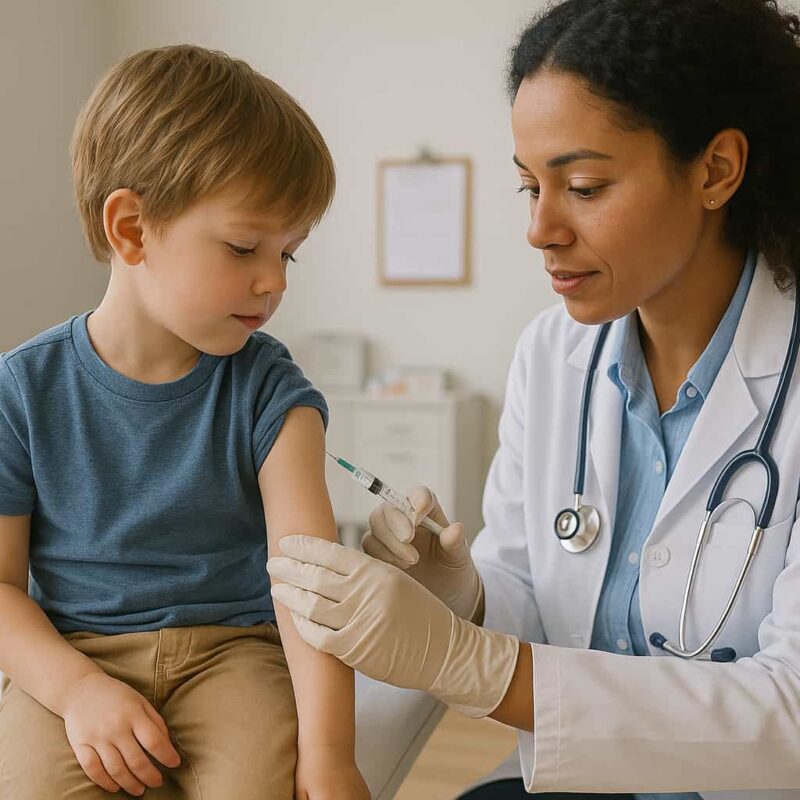Immunisations
Getting vaccinated doesn’t need to be a stressful experience. At HealthMint Medical Centre in Cranbourne North and Croydon, we create a calm and comforting environment to make immunisations easier for everyone. With relaxing interiors, soft music, and minimal wait times, we take the fear out of visiting the doctor—especially when it comes to needles.
Whether you’re vaccinating your child, protecting yourself as an adult, or preparing for travel, our experienced GPs and nurses are here to help you stay safe and healthy with comprehensive immunisation services.
Why Are Immunisations Important?
Vaccines are one of the most effective tools for preventing serious illness. They protect you and those around you by helping your immune system build defences against harmful diseases—before you’re ever exposed.
The benefits of immunisations go beyond individual protection. When enough people are vaccinated, we achieve herd immunity, which helps protect vulnerable groups who can’t be vaccinated. In short, vaccines help keep our whole community safer.
Childhood Immunisations at HealthMint
Children’s immune systems are still developing, making them more vulnerable to infection. That’s why it’s crucial to follow the Australian Childhood Immunisation Schedule to give your child the strongest protection from an early age.
At HealthMint, we offer childhood vaccines at all key milestones:
- Birth, 2 months, 4 months, 6 months
- 12 months, 18 months, 4 years
- School immunisation program (ages 10–15)
Our clinics in Cranbourne North and Croydon provide a calm space to help make the experience smoother for children and parents alike. If you have concerns about vaccine safety or side effects, our GPs are happy to answer all your questions with clear, evidence-based advice.
Looking for child vaccines in Cranbourne North or nearby? We’re here to help.
What Adult Immunisations Do We Provide?
Immunisation isn’t just for kids. Adults may need booster shots or new vaccinations based on age, health conditions, or lifestyle.
We offer:
- Boosters for tetanus, diphtheria, whooping cough
- HPV vaccines (up to age 26)
- Hepatitis A and B
- Pneumococcal vaccines for those over 65 or at risk
- MMR boosters if you missed them as a child
Factors such as Indigenous status, occupation, previous illnesses, or plans to start a family can influence which vaccines you may need. Our team can assess your history and create a tailored immunisation plan. If you’re in Croydon, our clinic offers adult vaccinations and booster immunisations with ease.
Stay Protected with Flu Vaccinations
Influenza spreads easily through coughing, sneezing, or touching contaminated surfaces—and for vulnerable groups like older adults and pregnant women, it can be dangerous or even fatal.
The flu virus mutates every year, which is why it’s important to get a flu shot annually. HealthMint offers seasonal flu immunisations from April onwards, with convenient appointments and friendly care.
Our flu vaccine clinics in Cranbourne North and Croydon also run annual flu drives. Contact our reception team to book your flu shot and reduce your risk of illness this winter.
Travel Vaccinations for a Safe Journey
Planning an overseas trip? Many destinations require or recommend specific vaccines to protect against diseases not common in Australia.
HealthMint offers a full range of travel vaccines, including:
- Hepatitis A and B
- Typhoid
- Yellow fever
- Japanese encephalitis
- Cholera and more
We recommend booking your travel immunisation consultation at least 6 weeks before departure to allow enough time for full protection. Learn more on our dedicated Travel Medicine page, or explore helpful tips in our travel vaccines blog.
If you’re in Cranbourne North or Croydon, our travel vaccination clinics are convenient, thorough, and tailored to your destination.
Protect Against Shingles with Vaccination
Shingles is a painful, blistering rash caused by the reactivation of the chickenpox virus. It affects nerves and often begins with flu-like symptoms, burning sensations, and headache before the rash appears.
To prevent shingles, two doses of the Shingrix vaccine are recommended—spaced 2–6 months apart (or 1–2 months for immunocompromised people).
This shingles vaccine is funded under the National Immunisation Program (NIP) for eligible Australians:
- Adults aged 65 years and older
- Aboriginal and Torres Strait Islander people aged 50+
- Individuals aged 18+ with moderate to severe immunocompromise
Looking for a shingles immunisation near Cranbourne or Croydon? HealthMint provides clear guidance, eligibility checks, and easy appointments.
How Do Immunisations Work?
Vaccines work by introducing a harmless, inactive form of a virus or bacteria into your body. This trains your immune system to recognise it and create antibodies—the body’s natural defence weapons.
If you’re ever exposed to the actual disease, your immune system will remember it and respond quickly, stopping you from getting seriously ill. Some vaccines offer lifelong protection, while others—like the flu shot—require updates due to how quickly viruses change.
In simple terms, immunisation helps your body build immunity safely, without needing to get sick first.
Book Your Immunisation Appointment Today
Whether you’re preparing for travel, protecting your child, or staying up-to-date with adult vaccines, our friendly team at HealthMint Cranbourne North and Croydon is here to help.



